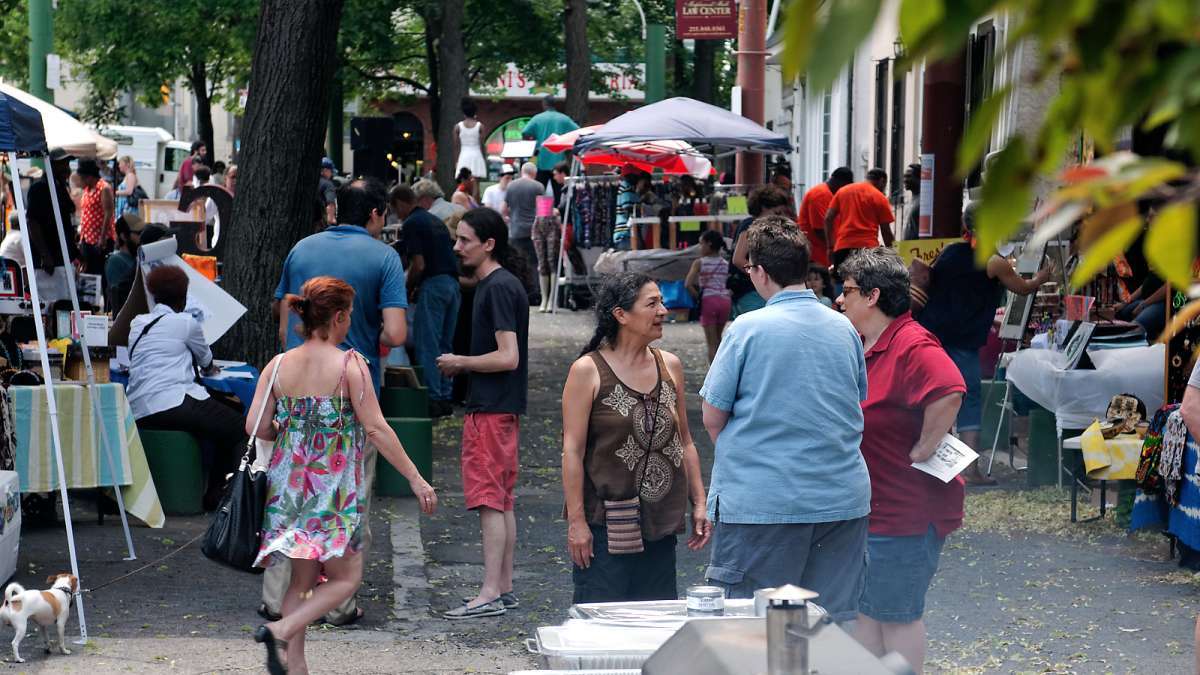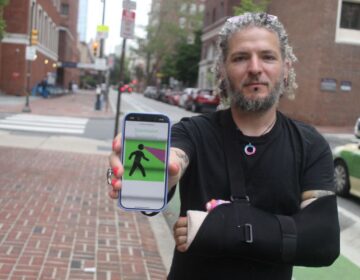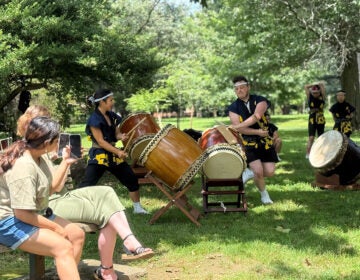$25K grant for Germantown to go towards bridging gaps in community engagement

A scene from last year's Re-Imagining Maplewood Mall Festival in Germantown. (Bas Slabbers/for NewsWorks)
What’s the trouble with the term “civic engagement”? It’s “grant-speak,” said Just Act theater group executive director Lisa Jo Epstein, who along with Germantown United CDC corridor manager Emaleigh Doley is spearheading the implementation of a new $25,000 civic engagement grant from the Pennsylvania Humanities Council.
“The regular person on the street who has two or three jobs, or who doesn’t have a job, or is a single mom, or whatever, they’re not thinking about ‘civic engagement,'” Epstein said. They might believe they have no impact on, for example, a major developer’s plans in the neighborhood.
So GUCDC is teaming with Just Act, a theater arts group specializing in community storytelling, to make a long-awaited new community plan a reality.
Germantown’s last comprehensive neighborhood plan was completed around 1950, said GUCDC executive director Andy Trackman. Realizing that the Philadelphia2035 plan wouldn’t impact the Northwest until 2017 at the very earliest, Trackman said GUCDC, along with Historic Germantown and Germantown Community Connection, felt a new urgency to address the neighborhood’s commercial corridor.
Trackman connected with Epstein last year. Her group recently completed an 18-month project in Chester called Chester Made, which mapped that city’s little-known cultural resources with the help of trained actor-facilitators in dialogue with locals.
Epstein, a Germantown resident, wanted to get involved in planning initiatives in her own neighborhood, so she invited Trackman to a 2015 PHC workshop for prospective civic engagement grant applications (a grant program run in partnership with the Orton Family Foundation).
Just Act and GUCDC wrote the grant together, and succeeded with the one-year, $25,000 award that will be split between the two organizations.
“We’re building an ensemble of trained facilitators both in the applied theater techniques and then facilitating the dialogue around issues that a lot of people don’t talk about,” Epstein said of Just Act’s techniques for engaging locals in telling the kinds of personal stories that organizations like GUCDC can mine for the feedback that makes an effective community plan including all voices.
“The work that Just Act does is really about using theater and stories to enable people to re-see themselves, to re-see how systematic oppression has shaped human interaction,” Epstein says. “There’s validation, there’s affirmation, there’s identifying the ways that lived experience of people who have been left out matter.”
Where would Trackman like to be with the process in one year? A new trove of collected data, he said: “People telling stories about their relationship to the corridor…the idea would be to have those stories retranslate into actual data that could be used to seek additional planning resources.”
That, and “a nice solid lift of additional Germantown residents who are active and engaged and want to be part of the community development process.” He wants to see a mix of new faces at existing meetings and initiatives, and particularly wants to bridge Germantown’s geographic divides.
“If you look at Germantown, generally the most active, vocal, strong voices are kind of concentrated on the west side of Germantown Avenue, and what I would like to see is more east side voices,” he said.
Currently, Epstein and Doley are forming a Community Advisory Team that will embark on a community network analysis preceding the storytelling outreach, which will ultimately include a youth as well as an adult ensemble of facilitators. A series of community story-gathering events, dates and venues TBA, will happen April through October.
The ultimate outcome will be recasting the term “civic engagement,” Epstein explained. “If we’re looking at the stories that make up a neighborhood, [and] the various authors of those stories…ideally they become invested in what happens in the rest of the story.”
“If you keep those storytelling opportunities going, then you can be the author,” she said. “What’s the next plot point?”
WHYY is your source for fact-based, in-depth journalism and information. As a nonprofit organization, we rely on financial support from readers like you. Please give today.




